With over 1600 Buddhist temples in Kyoto, we barely scratched the surface even with multiple visits to the city over several years. Of course, not all are famous, or even open to the public on a regular basis. Some you would need to attend during a special opening which usually coincides either with a holiday or seasonal events like the cherry blossom, camellia flowers or autumn leaves.
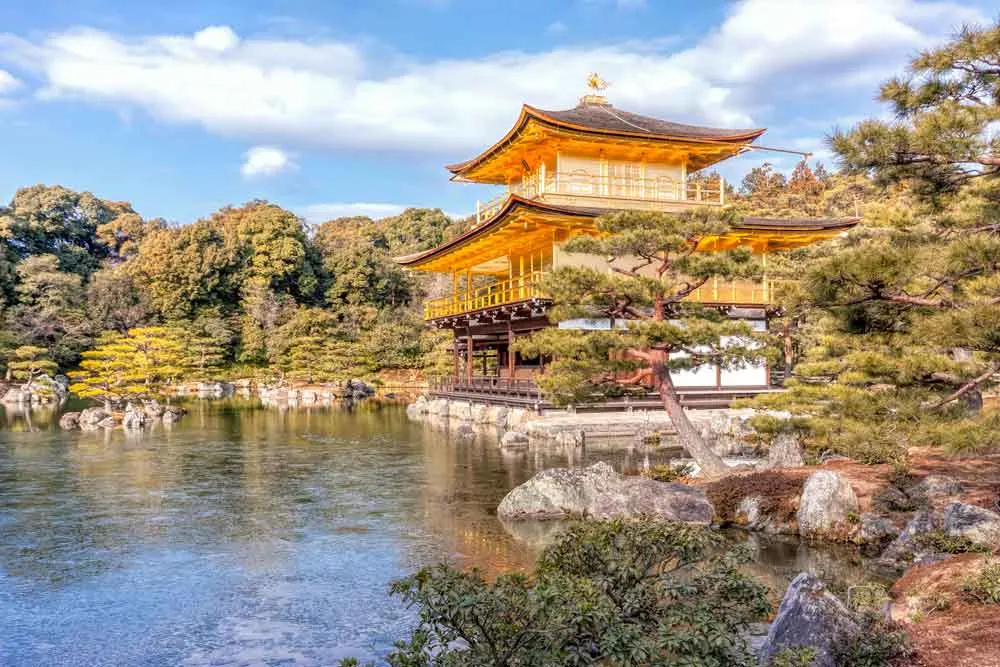
There are some temples in the city though that are so beautiful and so quintessentially Kyoto that they have wide appeal and at least a few of them are likely to make it onto the itinerary of most visitors. These are 15 of my favourite Kyoto temples including a couple of less familiar ones that are worth considering.
In Japan temples generally refer to Buddhist temples, whereas Shrines are the sacred spaces of the uniquely Japanese Shinto religion. In this article I’m considering only the Buddhist temples, there are also many beautiful Shinto Shrines but the two can’t really be compared so they deserve their own article.
Many temples are important historic and cultural spaces that are extremely expensive to maintain, most of the one’s tourists are likely to visit will charge a small fee to offset this upkeep. The fees vary but are usually between Y200 – Y700 so roughly $3-$8 depending on the exchange rate. Not all temples charge a fee, some have free entry or only charge a fee for specific sections with the rest free to walk around. This is a key difference between temples and shrines, even the most popular and famous shrines don’t charge a fee to enter.
Rather than ranking them in order, let’s be honest I tried and failed on that, I’ve sorted them broadly by regions. I hope this might make it easier to combine a few together or with other activities in that part of the city. I’ll give a brief description of why they are on my favourites list, perhaps a few will resonate with you and make it to your itinerary too. The links in the article are related articles that cover that temple and can provide additional detail for planning your visit.
Table of Contents
Temples in Kyoto’s North West
Kinkaku-ji
The golden pavilion of Kinkaku-Ji viewed across the lake is perhaps one of the most famous views in Kyoto. Clad in gold leaf it’s especially striking but can be a little crowded so pick your timing, early morning and avoiding holidays and weekends is usually best.
This particular temple building is stunning in all seasons but with a bit of sunshine it really gleams to its full effect. There are other buildings, gardens and a tea house here so allow enough time to see it all.
Ryoan-ji
It’s the gardens of this temple that I love the most, it has a huge pond with a backdrop of the northern hills. During the cherry blossom season they are covered in wild blossom trees or jewel coloured leaves in the autumn. The main feature of Ryoan-ji is the very famous zen stone garden. If you describe it as 15 rocks in a sea of gravel it really doesn’t do it justice, you need to sit for a while to appreciate the tranquility of this spot.
We visited right on opening time so we experienced it at it’s most serene. I think this one is best enjoyed without the bus loads that come later in the day.
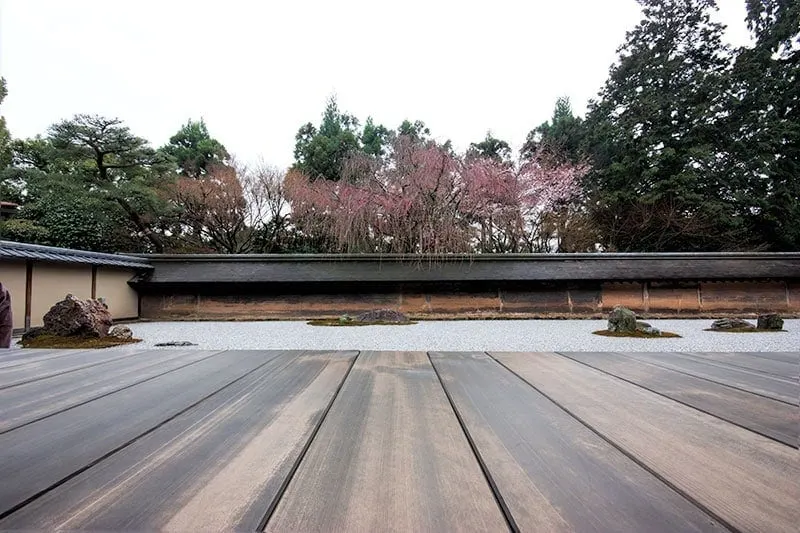
Myoshin-ji
This is a huge temple complex made up of a several large main buildings and around 50 sub temples. Most of the temple buildings can’t be entered but you can wander freely through the complex. The building pictured here is the Butsuden Hall, an important cultural asset.
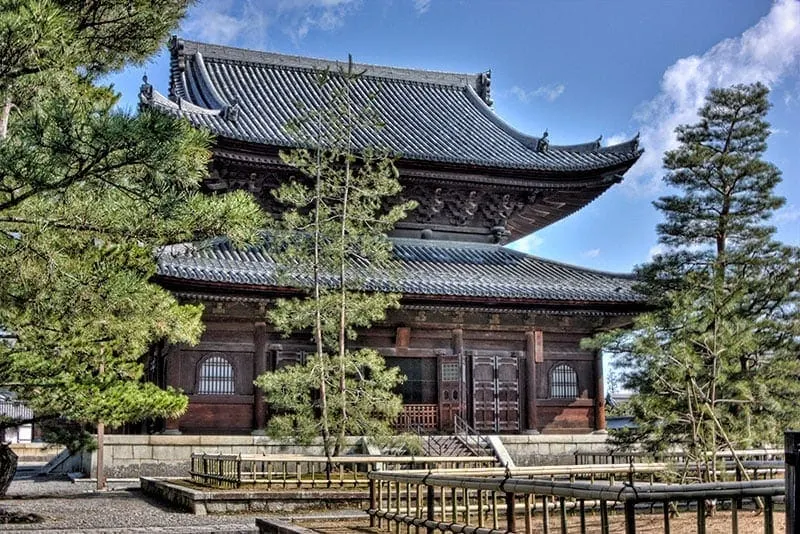
Temples in Kyoto’s Northern Higashiyama District
For more on exploring this slightly quieter area of Kyoto, you might want to take a look at the Philosophers Path self guided walking tour.
Ginkaku-ji
The silver pavilion is not silver, I just need to get that out of the way but it is the cultural home of so many of the zen arts that Kyoto is famous for. From garden design to architecture, Ikebana to the tea ceremony this temple played a vital role in their development and for that reason alone should be on your list.
As you move through the gardens and up the hill behind the temple you have great views out over the city. This is at the northern end of the Philosophers Path so is a great place to spend the day exploring that area and the temples, gardens and cafes along it.
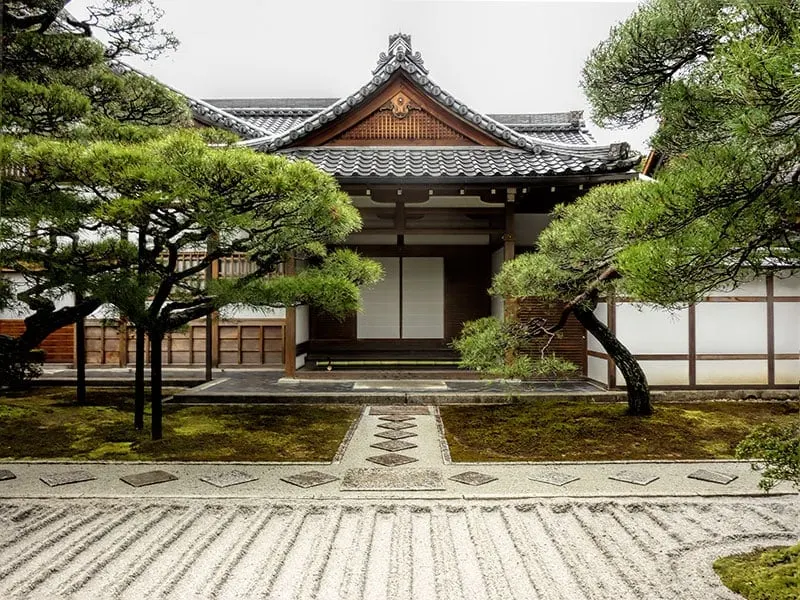
Honen
It’s a tough choice but this could be my favourite temple in Kyoto. It’s a delight from the moment you turn down the road and see the mossy roof of the thatched gate in front of you. Visit here for the purification mounds, the secret garden tucked away behind the temple and the special opening of the temple buildings during camellia season.
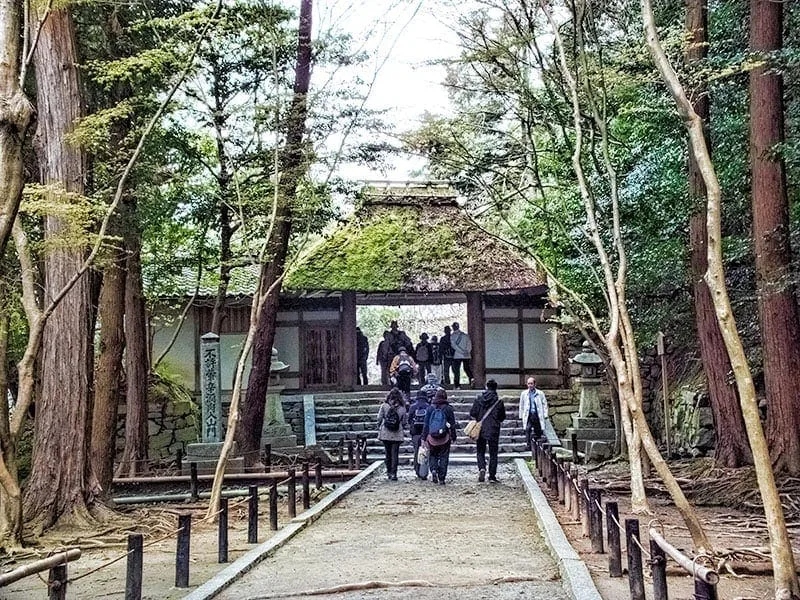
Eikan-do
A very beautiful temple during the koyo (autumn leaves) season. Being set into the hillside the view from the temple out over the red and orange leaves below is striking. This is the most distinctive building of the temple, the Tahoto pagoda, unfortunately my photo doesn’t do it justice as it’s uniqueness is the squared lower story and round upper story. Unfortunately the sun strike on the lens from further back just wasn’t giving me many options.
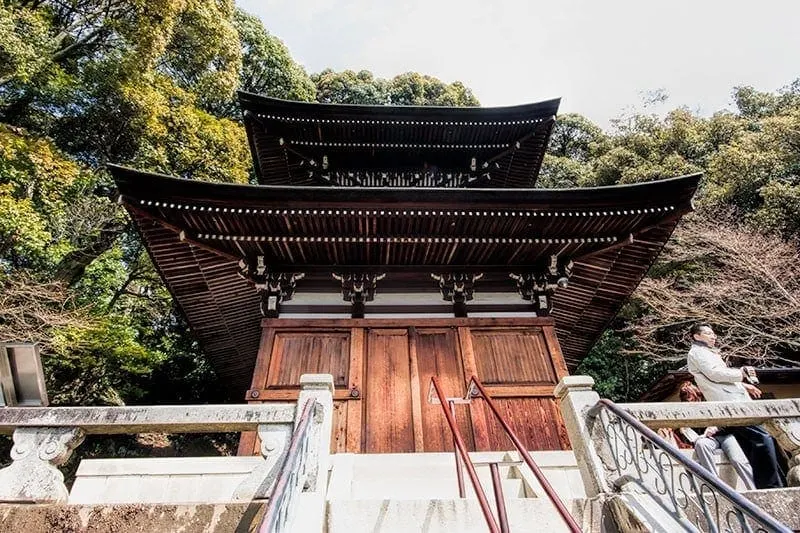
Nanzen-ji
A Zen temple with a bit of everything on a grand scale plus a few additional surprises, the enormous 2 storey gate, lovely gardens and a dramatic European style aqueduct. Many of the attractions of this temple are free to access and walk around.
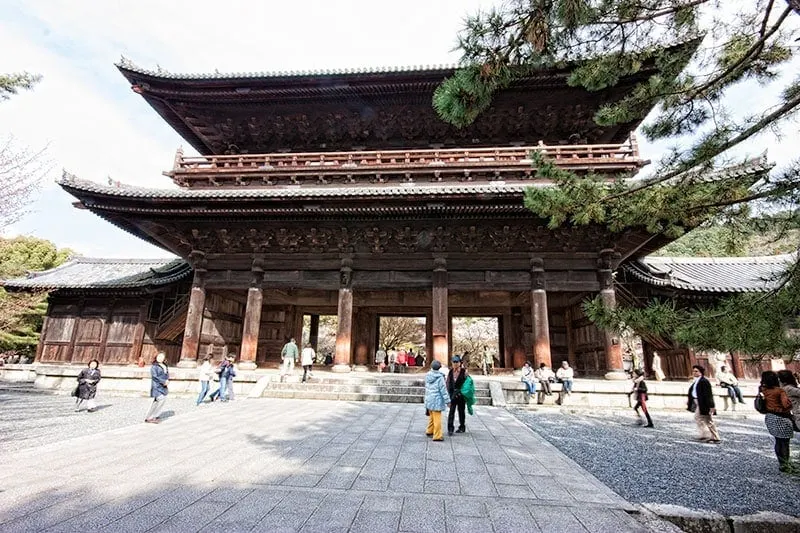
Temples in Kyoto Central
Rokkaku-do
There are many small temples all through Japans cities but there is just one I am covering in central Kyoto and that is because of my love of Ikebana, the Japanese art of flower arranging. Rokkakudo is located on Karasuma-dori not far from Nishiki market. The temple has been managed by Priests of the Ikenobo family since ancient times, the masters of Ikebana.
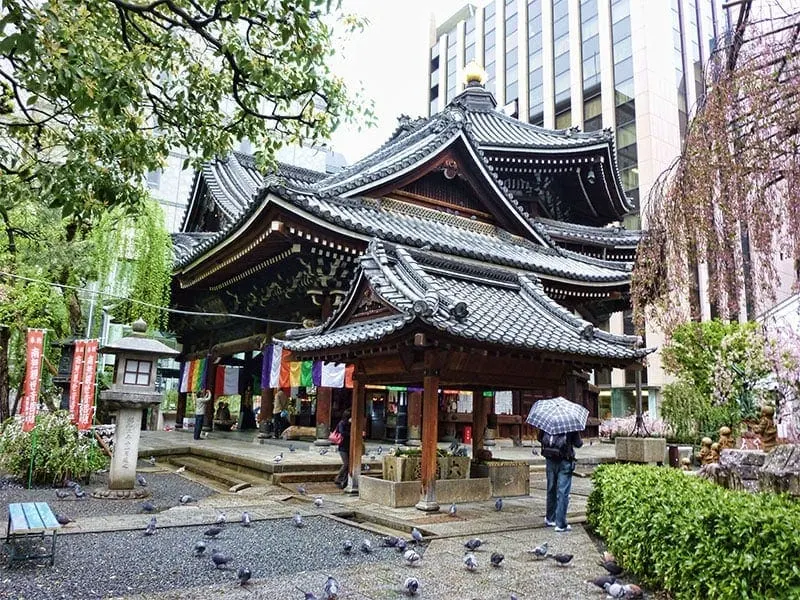
Temples in Kyoto’s Southern Higashiyama District
Kiyomizu-dera
Kiyomizudera is huge temple complex with plenty to explore, it’s always incredibly busy but set on the slopes of the eastern hills it’s not one to be missed. It’s massive wooden hall and overhang deck has been built without a single nail – and a LOT of people stand on that deck every day. Drink from the blessed waters and if you are lucky enough to time it right the blue dragon festival days are not to be missed.

Sanjusangen-do
It’s name literally means 33 gen (old Japanese measure) which makes it the longest wooden building in Japan but it’s what’s inside that’s going to blow you away. Filled with 1000 life size golden bodhisattva statues, it is absolutely amazing.
For me Sanjusangendo is a must see, we came across nothing else like it in our travels across Japan.
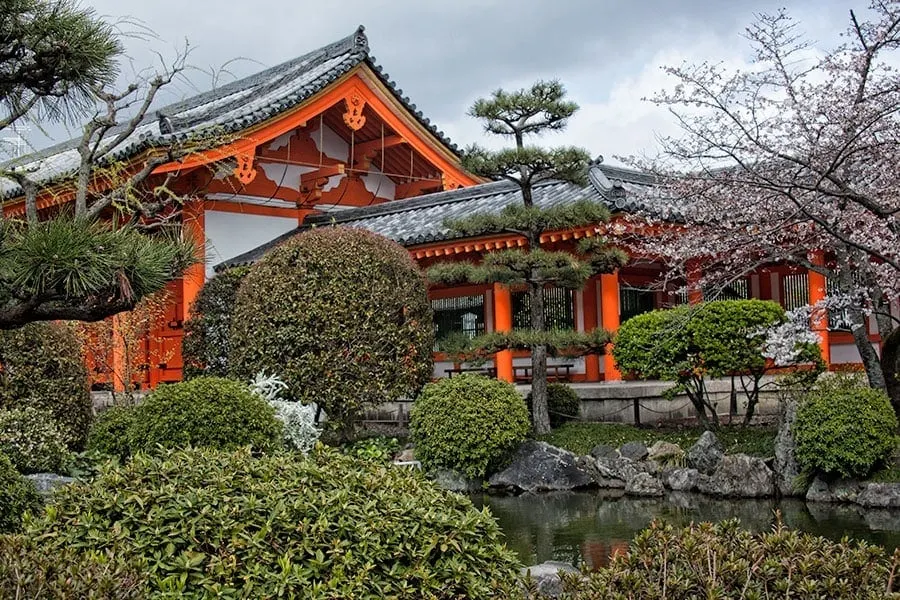
Temples in Kyoto’s South
These two are south of the station, one in walking distance, the other best accessed via the subway lines.
To-ji
Has a dramatic 5 story pagoda which aren’t seen very often in Japan, lovely gardens, lake, mature trees and an impressive treasure hall. Surprisingly Toji doesn’t seem to feature on many tourists agenda which in itself might be an attraction. (Note – this is an easy walk from Kyoto Station, don’t confuse it with another temple of the same name in the north west of the city)
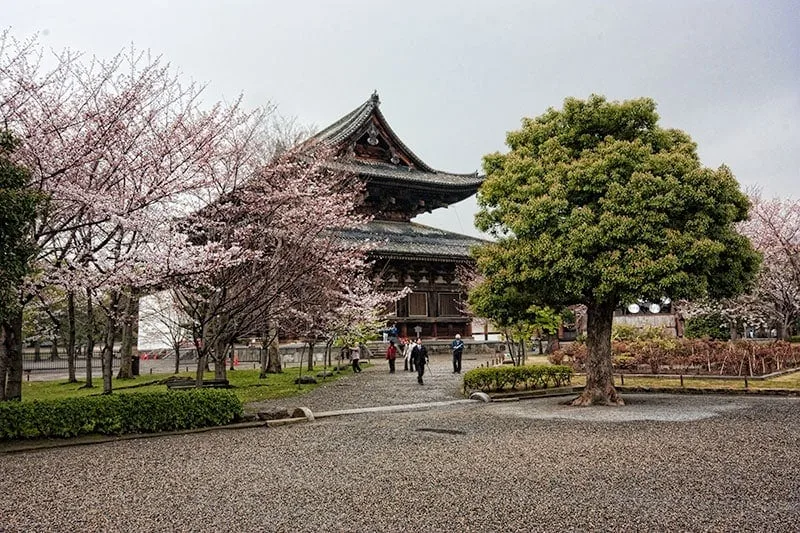
Daigo-ji
A huge temple complex and UNESCO world heritage site. This temple has many buildings including a 5 story pagoda, in addition it’s gardens are quite spectacular and there are a number of significant festivals here during the year including the spring recreation of Toyotomi Hideyoshi’s cherry blossom viewing parade.
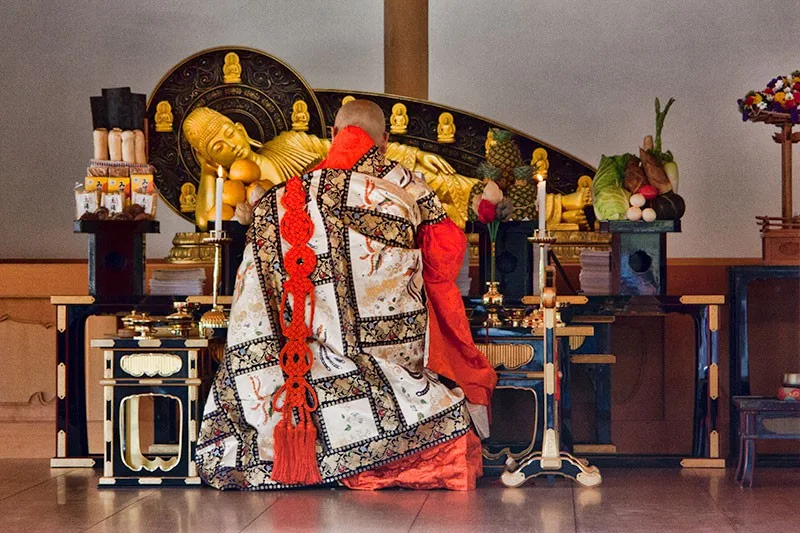
Temples in Kyoto’s Arashiyama District
Arashiyama makes a great day trip or part day if that is what you have available. We really enjoy the short trip out to the suburbs, you can easily pair up a few temples with the many other attractions on offer. The usual forms of transport are available but it is best explored on foot or hire a cycle to see some of the sites a little further from the station.
Tenryu-ji
A large Zen temple complex with a stunning garden, it’s the major temple visited in the area and is beautiful but crowded during sakura (blossom) and koyo (autumn leaves) seasons. Some of the bamboo glades that the area is known for are directly behind the temple.

Gio-ji
This temple backs on to the forest in the hills behind it but it’s the immaculate moss garden that is striking about a visit here. It’s a short stop but quite beautiful.
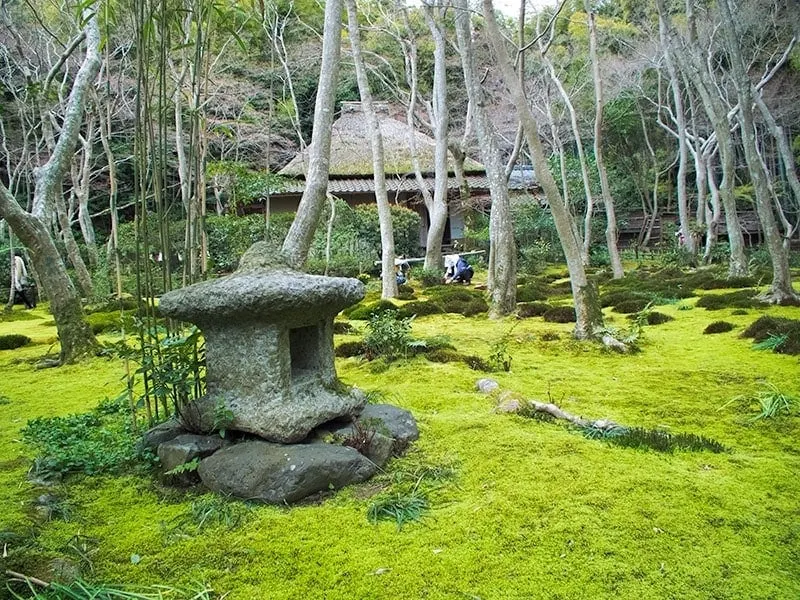
Nembutsu-ji
Nembutsu-ji was founded in the 9th century by the monk Kobo Daishi who features heavily in Buddhist history across Japan. The unique aspect of this temples are the stone statues, Kobo Daishi began placing these for the souls of the dead and they have continued to be added to over the centuries. Today the temple is home to thousands of stone statues. At the back of the temple is a short path leading through another bamboo grove.
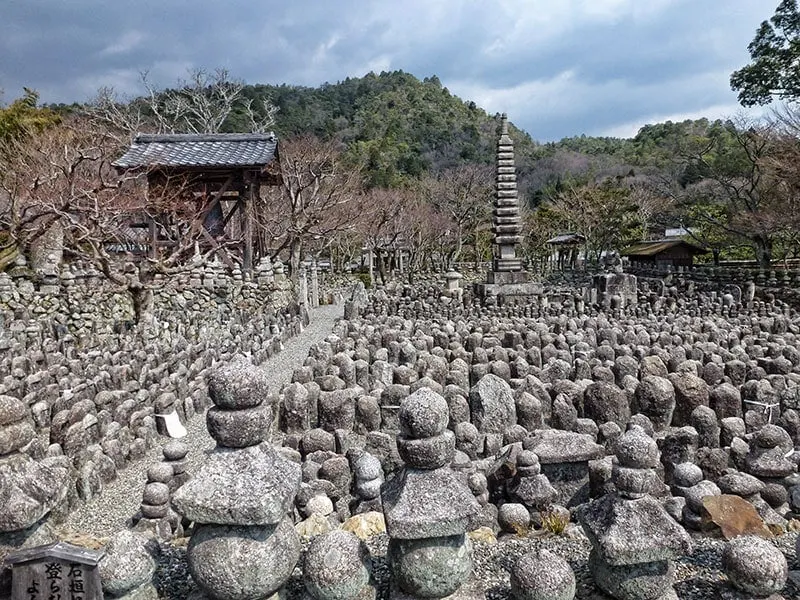
Each of these temples in Kyoto is special to me for its own reasons. Some for the history, others for their gardens, architecture or a special ceremony we attended. They are part of the fabric that makes Kyoto unique even within Japan. While I know my desire to visit so many temples and shrines isn’t shared by everyone I do believe that to skip this aspect completely from a visit to Kyoto would mean missing out on some of the city’s unique magic.
Please click on the photo and save to share on Pinterest
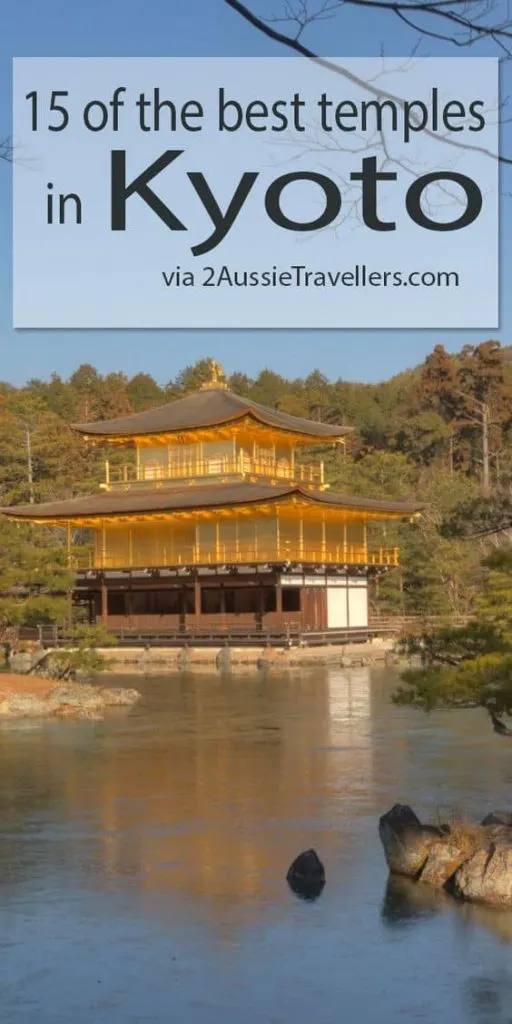
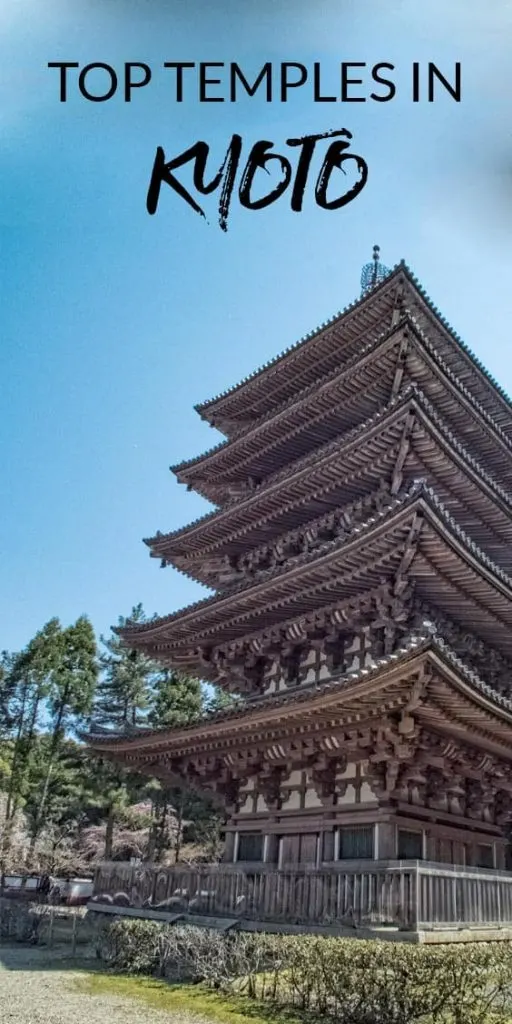
We hope you have the chance to visit some of the beautiful temples in Kyoto during your visit. If you have one you are particularly looking forward to or a favourite from your own experience we’d love to hear about it in the comments below!
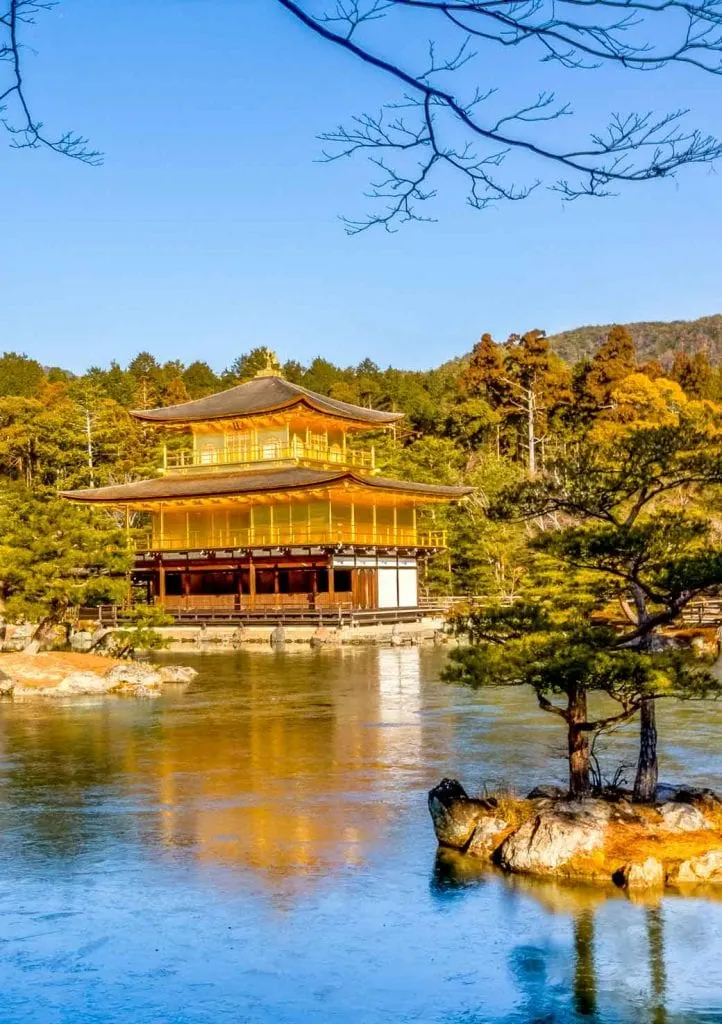
Paulo@Travel Bugs
Thursday 28th of January 2016
Thanks for sharing. Reminded of my Kyoto trip back in November. Will be sharing this in my blog soon :-)
2 Aussie Travellers
Thursday 28th of January 2016
Thanks Paulo, it's always good to meet another Japan fan in here :)
Justine
Monday 7th of December 2015
Hi Toni, just stumbled across your blog via Pinterest & am really enjoying your posts about Japan.
My hubby & I visited in autumn of last year & have been hankering to return ever since. We loved Kyoto & visited many of the spots you post about. At Kiyomizu-dera we went through a temple building before we saw the main temple, which involved walking in pitch blackness to a spinning stone illuminated by a shaft of light in the dark. It was an amazing & very unusual experience!
Thank you, I will be referring back to your blog for ideas & plans for our next odyssey. Just read in the paper today that JAL may be putting a direct flight from Perth to Tokyo back onto their schedule, so that would be a bonus! Next trip might be sooner than I thought!
Thanks again ..... Justine
2 Aussie Travellers
Tuesday 8th of December 2015
Thanks Justine, that's great news about JAL, I'd always prefer a direct flight option, I hope they do it. Did you make your wish at Tainai-meguri?
Best regards from far
Tuesday 10th of November 2015
Great post Toni, thank you: you made me travel back to Kyoto :-) I love your top 15. We were lucky enough to spend 6 weeks in Japan this past summer, and we also visited Kokedera (the temple of moss) in Kyoto. It requests a bit of preparation work, but it is so worth it!! Just stunning.
2 Aussie Travellers
Sunday 15th of November 2015
It's a great city to visit and your trip looks amazing, you packed so much into your visit
Rajesh
Thursday 23rd of July 2015
Awesome post! My wife and I have been researching for our upcoming Japan trip in autumn and Kyoto is one of our dream destinations. We have just stumbled upon your lovely blog and have been drawing from it copiously.
Would like your advice here in planning our trip. - Given the temples you have listed here and other must-see spots here, how many days would you advise we factor in for Kyoto? - Any pointers on the accommodation (areas, hotels etc.) in Kyoto? - What's the best/ideal way to cover these temples in and around Kyoto?
Thanks again for all the info backed by those nice snaps! Cheers Rajesh
Rashaad
Friday 19th of June 2015
I visited Kyoto several years ago and reading this article bring back memories of the city. When I was in the Kansai region, unfortunately, Ginkaku-ji was being renovated so I really didn't get to see much.
twoaussietravellers@yahoo.com
Saturday 20th of June 2015
So pleased it bought back some travel memories for you. Given the length of history behind so many of the castles and temples in Japan I guess it's not surprising that major renovation works are needed to keep them in the beautiful condition they are maintained in but it is so disappointing when you have planned to see something and it's shrouded in scaffold or coverings, we've had it happen a couple of times too.